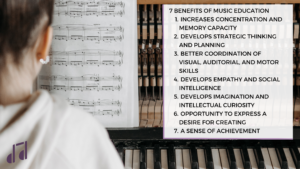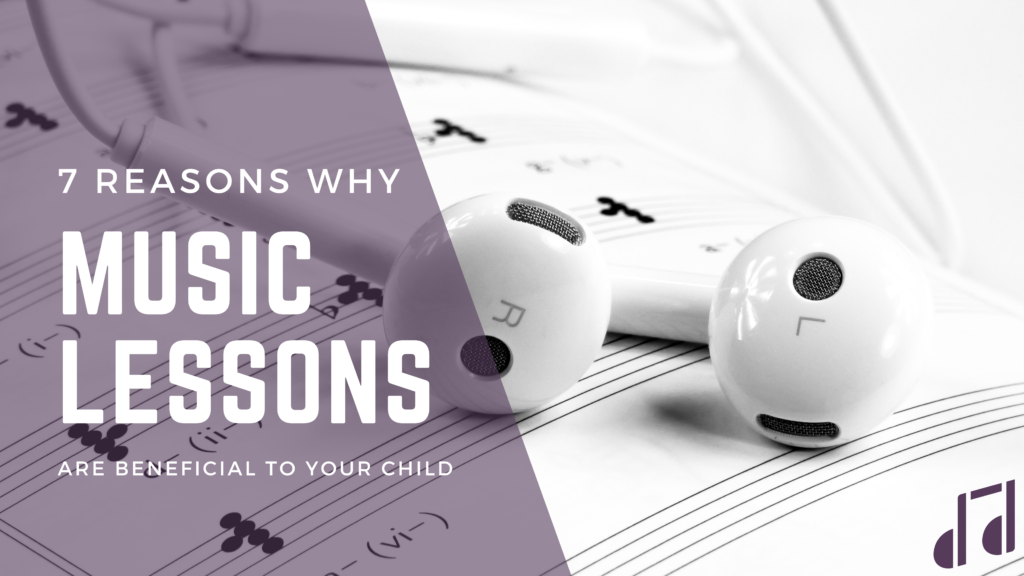Lesson Tips for Parents
7 reasons why music lessons are beneficial for your child
One of the most common questions that many parents ask before enrolling their children into music classes is what do you get from music education? Learning Do Re Mi stuff seems to many people like an entertaining activity, but some parents are also skeptical about the outcome of music lessons.
Mostly, they consider that playing music hasn’t enough benefits like some other subjects, such as coding, math or science. While coding does allow for a great advantage when it comes to technology and math sharpens logical thinking, music education equally and highly develops both sides of the brain – and creativity and logic.
Because of that, we decided to give you detailed insight about the part of an iceberg that is under the water: why are music lessons so popular over the centuries? In this text, you will find 7 benefits that you didn’t know that go hand in hand with music education.

1. Increases concentration and memory capacity
Research has proven that playing an instrument is not just playing music, but it is a great tool for developing concentration and expanding memory capacities. Students encounter hundreds of songs throughout the class, and each of them requires the use of several different skills simultaneously, such as reading and following notes, transferring visuals to the instrument, controlling finger movements, listening carefully to the played sound, memorizing music, and so on. Although we think that we have invested all our mental effort only in playing a song, all mentioned skills are sharpened in other spheres of life as well – they memorize information much faster, the fear of new challenges dissolves, and the focus becomes sharper.
2. Develop strategic thinking and planning
One song contains a vast amount of information that needs to be learned – which notes should be played, what are the places and durations of each of the notes, at which speed should be the song played, and how to properly color the songs with style characteristics and dynamic changes. It takes years and years of experience to do all mentioned above for the first time without a single mistake. That is why a systematic plan for execution helps! Creating a strategy where students divide one big assignment into smaller units frees them of the fear of big tasks and gives them efficient directions to the final goal.
Adapting the method of creating a strategic plan and determining priorities from an early age can be helpful in future more complex tasks. Numerous scientific researches have proven that children with music education have shown better results in college, more effectively and thoroughly acquired knowledge, and mastered all challenges with ease.
3. Better coordination of visual, auditorial, and motor skills
Yes, all three of these factors are the physical foundations of every human being, but with music lessons, they can be developed to a much better level. Even though watching a musician play subtle melodies on an instrument seems like an easy task to do, only a few know that playing any instrument requires a lot of mental and physical precision, concentration, and focus because they are using all three skills simultaneously. In the following simplified scheme, you can notice how visual, auditory, and motor skills are actively involved in playing in this process:
reading notes → acquiring of all information → visualization of body’s movement and expected sound product → transferring information into motion → listening to the obtained product
Encountering this amount of information and actions undoubtedly sharpens brain functions and body movement, but also it develops one of the most wanted skills of today’s era – multi-tasking!
4. Develops empathy and social intelligence
We all know that there is no song in this world in which at least one emotion is not involved. By learning many songs, students also encounter a wide variety of emotions. Scientific research has also shown that playing a musical instrument develops a child’s empathy and social intelligence. One of the most common emotions during music lessons is definitely fun because music lessons are different from any other classes – they are interactive, creative, joyful, dynamic, and never monotonous.
At San Ramon Academy of music, we love to create a story that would be relatable to the name and the sound of a song. Verbal presentation of music, as well as one’s own experience, not only improves the understanding of the composition he plays but also the meaning of all kinds of emotions.
5. Develops imagination and intellectual curiosity
In addition to the fact that the imagination is an active member of music art, the thoroughness that lies behind every song, even the simplest ones, actively develops intellectual curiosity. It can be seen from previous chapters that learning new songs is not based on just reading notes. The student must pay attention, see, understand and reproduce a large amount of information that is on paper so the song can come to life in the most beautiful light.
6. Opportunity to express a desire for creating
During the first lessons, students meet the creative world of art in which they have the opportunity to create something beautiful for themselves and their environment with their own fingers. We can also agree that music was always and is a significant part of human lives – with it, we go through many events throughout life. Having the opportunity to fulfill your home with beautiful melodies encourages and motivates you to create, whether by playing your favorite songs, composing new ones, or something completely different.
7. A sense for achievement
Every mastered song is a new gold medal, a giant trophy, an invaluable achievement, both for the student and his teacher. When they encounter this feeling at an early age, they will notice that effort always guarantees good results and fulfillment that will motivate them for the next steps in their future. That is why each parent should carefully choose a teacher who will motivate the student and help them achieve their best.
Can you believe those facts? Quite mind-blowing!
It is not surprising why music lessons have been an important part of education for centuries. Those facts have proven to us that playing an instrument isn’t just a trend of a time – it is an exciting journey that sharpens your brain cells!
Therefore, join us today and see through your example how a fun hobby can boost all of your skills!
Book your FREE trial lesson with us by clicking the links below!
Individual Lessons: Piano, Guitar, Violin, Singing, Trumpet, Composing!

